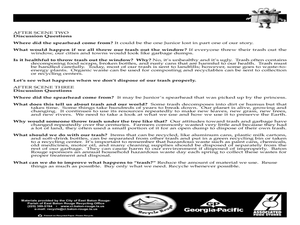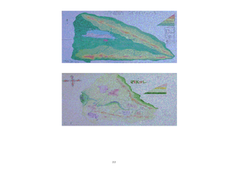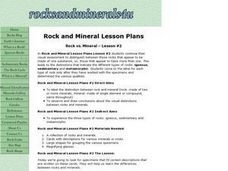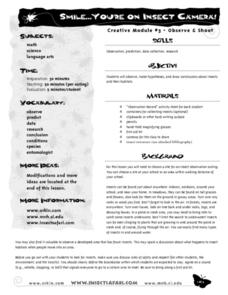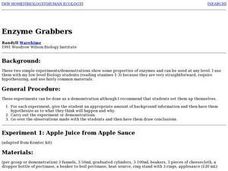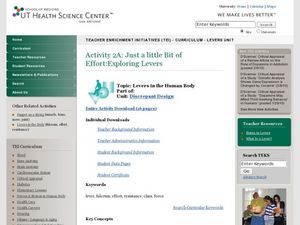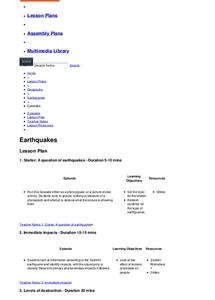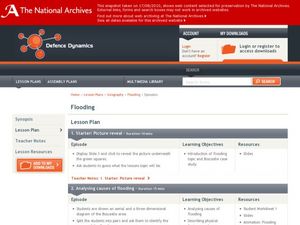Curated OER
Testing for Life
Students test for organic molecules to determine if a solution contains once living molecules. For this characteristics of life lesson, students test common liquids for the presence of organic molecules, including starch, protein, and...
Curated OER
Fitting Trash into Yesterday: A Fifth Grade Activity
Fifth graders explore the concept of waste management. In this recycling lesson, 5th graders discover the history of waste management and discuss how the U.S. should respond to the issue of ever-increasing waste.
Curated OER
A Tree is a Friend
Fifth graders discover the value of trees in our society. In this ecosystem instructional activity, 5th graders read the book, A Tree is Nice, and discuss with classmates how trees are essential to our existence due to creating oxygen...
Curated OER
Is There Liquid Water on Mars?
Students assess whether there is liquid water on Mars by analyzing images and data. In this planetary lesson students analyze temperature and pressure graphs and hypothesize about how water could have flowed on Mars.
Curated OER
Minerals of the Earth
Students learn and practice identifying Earth's minerals and their properties. Working in small groups, they evaluate minerals. This is a well-described lesson, which students enjoy.
Curated OER
Monkey See, Monkey Do
Students consider the influence of bullies and map the social ecosystem of their schools. They create lifelines that compare baboon and human development and write an essay that considers the relationship between psychosocial development...
Curated OER
Gray Whales
Explore the majestic grey whale while deepening your understanding of animal adaptations. Grey whales from head to toe are specifically designed to fit their environment. Learners will examine the ways in which the flippers, head, body,...
Curated OER
How to Make a Lake
Young scholars examine the Michigan state quarter and discuss the effects glaciers have on land formation. They perform an investigate using ice cubes and sand to show how glaciers have carved the land.
Curated OER
How Quickly Disease Spreads
Students demonstrate how quickly disease spreads and the importance of protective measures with communicable diseases. They examine past epidemics such as the Bubonic Plague and make predictions about future epidemics.They compare and...
Curated OER
Operation Genesis
Students, while working in groups under the Operation Genesis project involve fictional elements of role playing to grasp geographic concepts concerning human/environment interaction. They create the physical features of a fictional...
Curated OER
Rock vs. Mineral - Lesson #2
Students visually distinguish between those rocks that appear to be made of one substance, vs. those that appear to have more than one. This leads to the distinctions that indicate the different types of rocks: igneous, sedimentary and...
Curated OER
Smile...you're on Insect Camera!
Learners study insects. They go on an outdoor insect outing and look for insects in a variety of places--in the air, under rocks, on leaves, in water, etc. They record information about the insects they find, including habitat, weather...
Curated OER
Enzyme Grabbers
Students perform two experiments to show the properties of enzymes. They use pectinase to produce apple juice from applesauce to show enzyme action and then taste the difference between raw and boiled papaya seeds as evidence of enzyme...
Curated OER
Ecological Footprint
Eighth graders discover their own ecological footprint and create a plan for reducing this figure. They extend this to the school and community to see how they are doing on this scale. They discuss the concept of the ecological...
Curated OER
Carrot Sticks or French Fries?
Students investigate the influence of fast food brand names on food choices and analyze the factors that contribute to branding preferences. They write an opinion essay on the corporate responsibility to influence food choices.
Curated OER
Adaptations of Fishes for Survival in Polar Environments
Students compare the anatomy of temperature and polar fishes. They explore the adverse effects of cold on metabolism and physiology and discuss how polar fishes adapt to their environments. Comparisons are also made to the DNA sequences...
Curated OER
Calorie Connection
Students calculate the calories in a Brazil nut and the calories needed for daily intake. In this calories lesson plan, students use calorimetry to measure the change in water temperature heated by the burning of a Brazil nut. They also...
Curated OER
Can You See the Light?
Students investigate the transmission of light energy. In this light energy lesson plan, students observe bubbles using different colored filters and record their observations. They also look at a light source through various materials...
Curated OER
Just a Little Bit of Effort: Exploring Levers
Middle schoolers build models of types of levers. In this simple machines lesson, students use dowels and modified wooden rulers to build different types of levers. They compete to create the most efficient lever in the class.
Institute of Electrical and Electronics Engineers
Series and Parallel Circuits
Students demonstrate simple circuits and find the differences between parallel and serial circuits. In this electronic lesson plan students work in teams to test different designs using a low voltage light bulb.
Curated OER
Earthquakes
Students take a closer look at earthquakes. In this earthquake instructional activity, students investigate the causes of Kashmir earthquake and the impact of the earthquake. Students also consider aid efforts in the aftermath of...
Curated OER
Flooding
Students take a closer look at flooding. In this floods lesson, students investigate the causes of flooding and the impact of flooding as they examine a flooding animation.
Curated OER
Germs and the Importance of Washing Your Hands
Students determine the importance of hand washing through experiments. In this hand washing and germs lesson, students listen to a reading of Germs! Germs! Germs! by Bobbi Katz, and discuss what they learn about germs. They experiment by...
Curated OER
The Solar Cycle
Learners research the solar cycle. In this Science lesson, students use the internet to investigate the solar cycle. Learners produce a spreadsheet and graph from the information collected.



